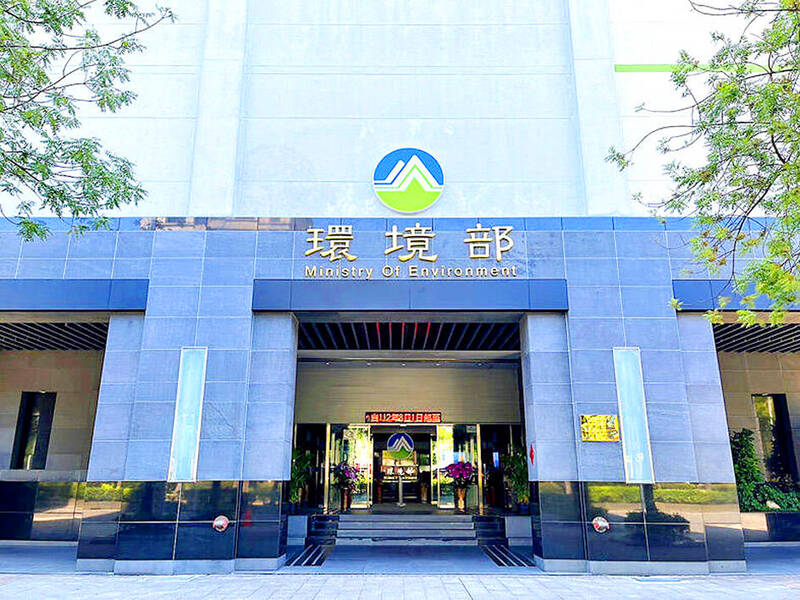The Ministry of Environment has announced draft amendments to regulations on waste disposal and recycling to promote a circular economy in line with the UN Sustainable Development Goals (SDGs).
Resource circulation is widely considered to be a critical pathway to achieve SDGs and net zero goals, the ministry said.
The EU’s New Circular Economy Action Plan published in 2020 has revealed the importance of incorporating sustainable and circular elements into product designs instead of traditional waste management, it said.

Photo: Chen Chia-yi, Taipei Times
As current laws are not sufficient to respond to circular economy developments and industrial demand, the ministry would revise the Resource Recycling Act (資源回收再利用法), which would be renamed “the resource circulation promotion act,” and the Waste Disposal Act (廢棄物清理法), it said.
The goal is to “maximize resource circulation benefits, minimize final waste disposal” by shifting from waste recycling to resource circulation, and introducing a more comprehensive mechanism to prevent illegal dumping, it said.
GUIDELINES
The resource circulation promotion act would facilitate interagency collaborations in establishing a national resource circulation program, it said.
It would also enable authorities to establish green design guidelines for products and construction projects, set packaging reuse or reduction targets for businesses, and prohibit or restrict the production, import, sale or use of certain products and packaging, the ministry said.
The government would offer rewards or subsidies for companies or organizations purchasing circular products, it said.
The ministry said that amendments to the Waste Disposal Act would focus on clamping down on illegal waste disposal.
Resource Circulation Administration Director-General Lai Ying-ying (賴瑩瑩) on Thursday said the amended Waste Disposal Act would require manufacturers and importers to pay a “clearance and disposal fee” for their business waste.
REGULATION OF FEES
The ministry had been exploring the feasibility of charging a “resource circulation promotion fee” to fund business waste recycling and reuse, but decided on imposing the “clearance and disposal fee,” Lai said.
The ministry made the decision mainly because of business operators’ concerns about inflationary spikes while they are already financially burdened with other environmental charges such as carbon, air pollution, and soil and groundwater pollution remediation fees, she said.
The ministry replaced the “resource circulation promotion fee” with the “clearance and disposal fee,” so that manufacturers or importers can be held responsible if their business generates waste that is difficult to be recycled or illegally dumped, she said.

SHIPS, TRAINS AND AUTOMOBILES: The ministry has announced changes to varied transportation industries taking effect soon, with a number of effects for passengers Beginning next month, the post office is canceling signature upon delivery and written inquiry services for international registered small packets in accordance with the new policy of the Universal Postal Union, the Ministry of Transportation and Communications said yesterday. The new policy does not apply to packets that are to be delivered to China, the ministry said. Senders of international registered small packets would receive a NT$10 rebate on postage if the packets are sent from Jan. 1 to March 31, it added. The ministry said that three other policies are also scheduled to take effect next month. International cruise ship operators

HORROR STORIES: One victim recounted not realizing they had been stabbed and seeing people bleeding, while another recalled breaking down in tears after fleeing A man on Friday died after he tried to fight the knife-wielding suspect who went on a stabbing spree near two of Taipei’s busiest metro stations, Taipei Mayor Chiang Wan-an (蔣萬安) said. The 57-year-old man, identified by his family name, Yu (余), encountered the suspect at Exit M7 of Taipei Main Station and immediately tried to stop him, but was fatally wounded and later died, Chiang said, calling the incident “heartbreaking.” Yu’s family would receive at least NT$5 million (US$158,584) in compensation through the Taipei Rapid Transit Corp’s (TRTC) insurance coverage, he said after convening an emergency security response meeting yesterday morning. National

PLANNED: The suspect visited the crime scene before the killings, seeking information on how to access the roof, and had extensively researched a 2014 stabbing incident The suspect in a stabbing attack that killed three people and injured 11 in Taipei on Friday had planned the assault and set fires at other locations earlier in the day, law enforcement officials said yesterday. National Police Agency (NPA) Director-General Chang Jung-hsin (張榮興) said the suspect, a 27-year-old man named Chang Wen (張文), began the attacks at 3:40pm, first setting off smoke bombs on a road, damaging cars and motorbikes. Earlier, Chang Wen set fire to a rental room where he was staying on Gongyuan Road in Zhongzheng District (中正), Chang Jung-hsin said. The suspect later threw smoke grenades near two exits

The Forestry and Nature Conservation Agency yesterday launched a gift box to market honey “certified by a Formosan black bear” in appreciation of a beekeeper’s amicable interaction with a honey-thieving bear. Beekeeper Chih Ming-chen (池明鎮) in January inspected his bee farm in Hualien County’s Jhuosi Township (卓溪) and found that more than 20 beehives had been destroyed and many hives were eaten, with bear droppings and paw prints near the destroyed hives, the agency said. Chih returned to the farm to move the remaining beehives away that evening when he encountered a Formosan black bear only 20m away, the agency said. The bear